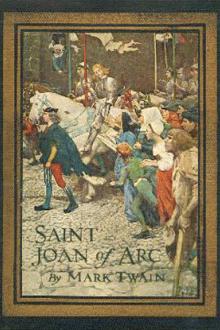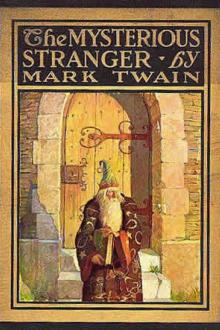Personal Recollections of Joan of Arc, vol 2, Mark Twain [books to read for beginners .TXT] 📗

- Author: Mark Twain
- Performer: -
Book online «Personal Recollections of Joan of Arc, vol 2, Mark Twain [books to read for beginners .TXT] 📗». Author Mark Twain
Joan summoned Troyes to surrender. Its commandant, seeing that she had no artillery, scoffed at the idea, and sent her a grossly insulting reply. Five days we consulted and negotiated. No result. The King was about to turn back now and give up. He was afraid to go on, leaving this strong place in his rear. Then La Hire put in a word, with a slap in it for some of his Majesty’s advisers:
“The Maid of Orleans undertook this expedition of her own motion; and it is my mind that it is her judgment that should be followed here, and not that of any other, let him be of whatsoever breed and standing he may.”
There was wisdom and righteousness in that. So the King sent for the Maid, and asked her how she thought the prospect looked. She said, without any tone of doubt or question in her voice:
“In three days’ time the place is ours.”
The smug Chancellor put in a word now:
“If we were sure of it we would wait her six days.”
“Six days, forsooth! Name of God, man, we will enter the gates to-morrow!”
Then she mounted, and rode her lines, crying out:
“Make preparation—to your work, friends, to your work! We assault at dawn!”
She worked hard that night, slaving away with her own hands like a common soldier. She ordered fascines and fagots to be prepared and thrown into the fosse, thereby to bridge it; and in this rough labor she took a man’s share.
At dawn she took her place at the head of the storming force and the bugles blew the assault. At that moment a flag of truce was flung to the breeze from the walls, and Troyes surrendered without firing a shot.
The next day the King with Joan at his side and the Paladin bearing her banner entered the town in state at the head of the army. And a goodly army it was now, for it had been growing ever bigger and bigger from the first.
And now a curious thing happened. By the terms of the treaty made with the town the garrison of English and Burgundian soldiery were to be allowed to carry away their “goods” with them. This was well, for otherwise how would they buy the wherewithal to live? Very well; these people were all to go out by the one gate, and at the time set for them to depart we young fellows went to that gate, along with the Dwarf, to see the march-out. Presently here they came in an interminable file, the foot-soldiers in the lead. As they approached one could see that each bore a burden of a bulk and weight to sorely tax his strength; and we said among ourselves, truly these folk are well off for poor common soldiers. When they were come nearer, what do you think? Every rascal of them had a French prisoner on his back! They were carrying away their “goods,” you see—their property—strictly according to the permission granted by the treaty.
Now think how clever that was, how ingenious. What could a body say? what could a body do? For certainly these people were within their right. These prisoners were property; nobody could deny that. My dears, if those had been English captives, conceive of the richness of that booty! For English prisoners had been scarce and precious for a hundred years; whereas it was a different matter with French prisoners. They had been over-abundant for a century. The possessor of a French prisoner did not hold him long for ransom, as a rule, but presently killed him to save the cost of his keep. This shows you how small was the value of such a possession in those times. When we took Troyes a calf was worth thirty francs, a sheep sixteen, a French prisoner eight. It was an enormous price for those other animals—a price which naturally seems incredible to you. It was the war, you see. It worked two ways: it made meat dear and prisoners cheap.
Well, here were these poor Frenchmen being carried off. What could we do? Very little of a permanent sort, but we did what we could. We sent a messenger flying to Joan, and we and the French guards halted the procession for a parley—to gain time, you see. A big Burgundian lost his temper and swore a great oath that none should stop him; he would go, and would take his prisoner with him. But we blocked him off, and he saw that he was mistaken about going—he couldn’t do it. He exploded into the maddest cursings and revilings, then, and, unlashing his prisoner from his back, stood him up, all bound and helpless; then drew his knife, and said to us with a light of sarcasting triumph in his eye:
“I may not carry him away, you say—yet he is mine, none will dispute it. Since I may not convey him hence, this property of mine, there is another way. Yes, I can kill him; not even the dullest among you will question that right. Ah, you had not thought of that—vermin!”
That poor starved fellow begged us with his piteous eyes to save him; then spoke, and said he had a wife and little children at home. Think how it wrung our heartstrings. But what could we do? The Burgundian was within his right. We could only beg and plead for the prisoner. Which we did. And the Burgundian enjoyed it. He stayed his hand to hear more of it, and laugh at it. That stung. Then the Dwarf said:
“Prithee, young sirs, let me beguile him; for when a matter requiring permission is to the fore, I have indeed a gift in that sort, as any will tell you that know me well. You smile; and that is punishment for my vanity; and fairly earned, I grant you. Still, if I may toy a little, just a little—” saying which he stepped to the Burgundian and began a fair soft speech, all of goodly and gentle tenor; and in the midst he mentioned the Maid; and was going on to say how she out of her good heart would prize and praise this compassionate deed which he was about to— It was as far as he got. The Burgundian burst into his smooth oration with an insult leveled at Joan of Arc. We sprang forward, but the Dwarf, his face all livid, brushed us aside and said, in a most grave and earnest way:
“I crave your patience. Am not I her guard of honor? This is my affair.”
And saying this he suddenly shot his right hand out and gripped the great Burgundian by the throat, and so held him upright on his feet. “You have insulted the Maid,” he said; “and the Maid is France. The tongue that does that earns a long furlough.”
One heard the muffled cracking of bones. The Burgundian’s eyes began to protrude from their sockets and stare with a leaden dullness at vacancy. The color deepened in his face and became an opaque purple. His hands hung down limp, his body collapsed with a shiver, every muscle relaxed its tension and ceased from its function. The Dwarf took away his hand and the column of inert mortality sank mushily to the ground.
We struck the bonds from the prisoner and told him he was free. His crawling humbleness changed to frantic joy in a moment, and his ghastly fear to a childish rage. He flew at that dead corpse and kicked it, spat in its face, danced upon it, crammed mud into its mouth, laughing, jeering, cursing, and volleying forth indecencies and bestialities like a drunken fiend. It was a thing to be expected; soldiering makes few saints. Many of the onlookers laughed, others were indifferent, none was surprised. But presently in his mad caperings the freed man capered within reach of the waiting file, and another Burgundian promptly slipped a knife through his neck, and down he went with a death-shriek, his brilliant artery blood spurting ten feet as straight and bright as a ray of light. There was a great burst of jolly laughter all around from friend and foe alike; and thus closed one of the pleasantest incidents of my checkered military life.
And now came Joan hurrying, and deeply troubled. She considered the claim of the garrison, then said:
“You have right upon your side. It is plain. It was a careless word to put in the treaty, and covers too much. But ye may not take these poor men away. They are French, and I will not have it. The King shall ransom them, every one. Wait till I send you word from him; and hurt no hair of their heads; for I tell you, I who speak, that that would cost you very dear.”
That settled it. The prisoners were safe for one while, anyway. Then she rode back eagerly and required that thing of the King, and would listen to no paltering and no excuses. So the King told her to have her way, and she rode straight back and bought the captives free in his name and let them go.
Chapter 35 The Heir of France is Crowned
IT WAS here hat we saw again the Grand Master of the King’s Household, in whose castle Joan was guest when she tarried at Chinon in those first days of her coming out of her own country. She made him Bailiff of Troyes now by the King’s permission.
And now we marched again; Ch�lons surrendered to us; and there by Ch�lons in a talk, Joan, being asked if she had no fears for the future, said yes, one—treachery. Who would believe it? who could dream it? And yet in a sense it was prophecy. Truly, man is a pitiful animal.
We marched, marched, kept on marching; and at last, on the 16th of July, we came in sight of our goal, and saw the great cathedraled towers of Rheims rise out of the distance! Huzza after huzza swept the army from van to rear; and as for Joan of Arc, there where she sat her horse gazing, clothed all in white armor, dreamy, beautiful, and in her face a deep, deep joy, a joy not of earth, oh, she was not flesh, she was a spirit! Her sublime mission was closing—closing in flawless triumph. To-morrow she could say, “It is finished—let me go free.”
We camped, and the hurry and rush and turmoil of the grand preparations began. The Archbishop and a great deputation arrived; and after these came flock after flock, crowd after crowd, of citizens and country-folk, hurrahing, in, with banners and music, and flowed over the camp, one rejoicing inundation after another, everybody drunk with happiness. And all night long Rheims was hard at work, hammering away, decorating the town, building triumphal arches and clothing the ancient cathedral within and without in a glory of opulent splendors.
We moved betimes in the morning; the coronation ceremonies would begin at nine and last five hours. We were aware that the garrison of English and Burgundian soldiers had given up all thought of resisting the Maid, and that we should find the gates standing hospitably open and the whole city ready to welcome us with enthusiasm.
It was a delicious morning, brilliant with sunshine, but cool and fresh and inspiring. The army was in great form, and fine to see, as it uncoiled from its lair fold by fold, and stretched away on the final march of the peaceful Coronation Campaign.
Joan, on her black horse, with the Lieutenant-General and the personal staff grouped about her, took post for a final review and a good-by; for she was not expecting to ever be a soldier





Comments (0)